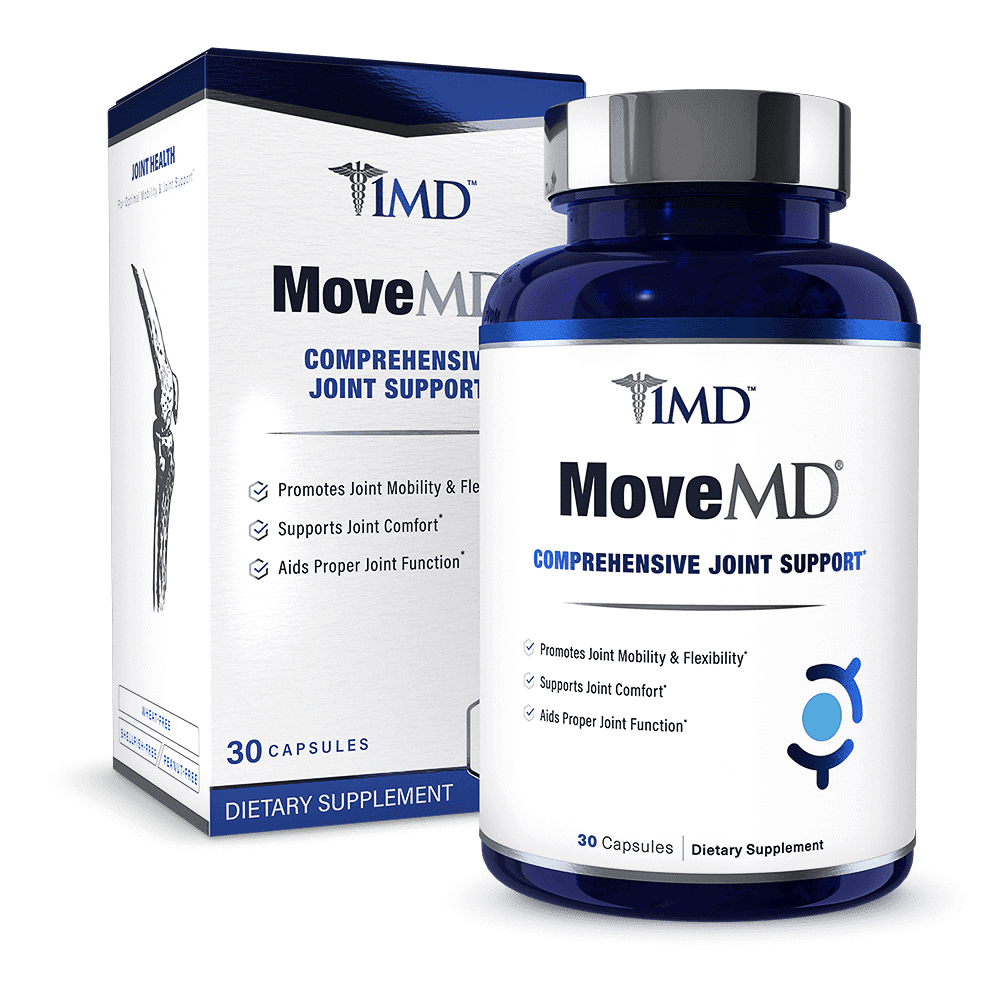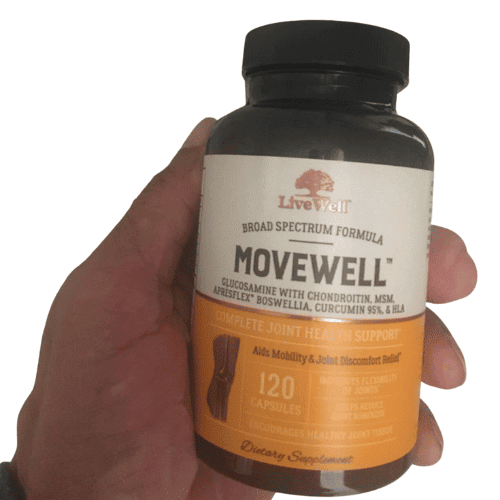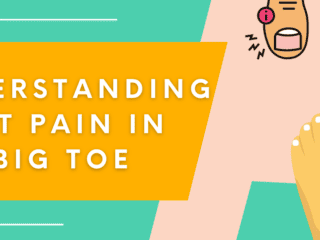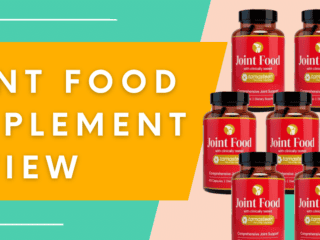Druggenius.com is reader-supported. We may earn a commission through products purchased using links on this page. Learn more about our editorial process here.
For countless women navigating the turbulent waters of menopause, joint pain emerges as an unwelcome companion. While many articles might promise you relief, how many truly understand the depth of your discomfort and the urgency of your search?
As someone who has spent a long time researching and understanding the nuances of joint pain and menopause-related issues, I’ve identified a pressing need: a comprehensive guide to the best supplements specifically tailored for menopausal joint pain.
- Top 3 Supplements for Menopausal Joint Pain
- Understanding Menopause and Joint Pain
- Ingredients to Look for in Joint Supplements for Menopause
- Spotlight on Top Joint Supplements For Menopausal Women
- How to Choose the Right Supplement
- Natural Ways to Alleviate Menopause Joint Pain
- FAQ (Frequently Asked Questions)
- How often should I take supplements for menopause joint pain?
- Are there any contraindications for menopause joint pain supplements?
- Which brands of menopause joint pain supplements are most trusted?
- Can I combine different supplements for menopause joint pain?
- What other non-supplement methods can help reduce menopause joint pain?
- Recap
- Conclusion
Top 3 Supplements for Menopausal Joint Pain
2 – MoveMD
3 – Movewell Plus
The Physio Flex Pro supplement stands out as the top choice for addressing joint pain in menopausal women, and here’s why: Menopause often brings with it a host of challenges, notably joint pain, primarily due to hormonal shifts leading to increased inflammation.
Key ingredients in Physio Flex Pro, such as Glucosamine, Bromelain, Ginger, and Turmeric, are renowned for their anti-inflammatory properties, offering targeted relief to joint discomfort that many women experience during this phase.
Moreover, the inclusion of MSM and Selenium in the formula ensures enhanced joint mobility and flexibility, crucial as collagen levels often dip during menopause.
The combination of these potent ingredients, tailored to counteract the specific challenges of menopause, makes Physio Flex Pro an unparalleled choice.
Understanding Menopause and Joint Pain
What is Menopause?
Menopause is a natural biological process that signifies the end of a woman’s menstrual cycle, diagnosed after a year without a menstrual period. Menopause usually occurs in a woman in her 40s or 50s.
In some cases, a woman might experience what is called “surgical menopause,” which, as its name suggests, can be triggered by surgical procedures like a hysterectomy (surgical removal of the ovaries, which produce hormones). Surgically removing the uterus or ovaries and not taking hormones will trigger symptoms of menopause almost immediately, regardless of age.
With these changes, menopause also brings about some symptoms that appear in perimenopause, or the months or years leading up to menopause:
- Irregular periods
- Vaginal dryness
- Hot flashes
- Chills
- Night sweats
- Sleeping problems
- Mood/behavioral changes
- Thinning hair
- Dry and dull skin
- Loss of breast fullness
- Unexpected weight gain
Why Does Menopause Cause Joint Pain?
Joint pain affects many people as they age, but it’s common among menopausal women.
Changing Estrogen Levels
The joint system is filled with estrogen receptors. Estrogen helps the body maintain cartilage and other joint tissues, protecting the bones and helping keep inflammation low. If estrogen levels are low and these tissues become damaged, it leads to more friction in the joints, causing them to become swollen and painful.
Loss Of Bone Density
Another contributing factor to menopausal joint pain is decreased bone density – the continuously decreasing estrogen levels also lead to bone density loss, increasing the risk of osteoporosis and other bone-related problems for menopausal women, leading to joint pain.
Decrease in Muscle Mass
Muscle atrophy is the wasting or thinning of muscle mass caused by the disuse of muscles or neurogenic conditions. Symptoms include decreased muscle mass, numbness, weakness, and tingling in the limbs. It also sometimes causes the shrinkage of one limb.
Studies show that better muscle strength could decrease the risk of arthralgia and back and joint stiffness.
Weight Gain
Weight gain, in general, increases the risk of joint pain and inflammation. The excess weight puts additional stress on weight-bearing joints (the knees, back, and feet) and causes inflammation and swelling, causing immobility and pain.
Ingredients to Look for in Joint Supplements for Menopause
Omega-3 Fatty Acids
Omega-3 fatty acids (also called omega-3 fats and n-3 fats) are considered essential fats, which means the body can’t make them on its own but must get them from food sources. Regarding bone-related health concerns, women are generally at higher risk of osteoporosis than men, especially after menopause, due to the drop in estrogen levels. Omega-3s are known for their ability to combat chronic inflammation, which plays a significant role in the risk of osteoporosis.
One study found that people who take omega-3s regularly generally have better bone mineral density and a reduced risk of fragility fractures. Other studies also showed that omega-3 fatty acids may help reduce inflammation in the joints and improve some people’s symptoms of rheumatoid arthritis, such as morning stiffness, tender/swollen joints, and joint pains.
Glucosamine and Chondroitin
Glucosamine is a naturally occurring amino acid found in the cartilage with anti-inflammatory effects, relieving mild to moderate osteoarthritis. Studies show that glucosamine is effective in relieving pain caused by aging-induced osteoarthritis in the joints, endorsing it as an ideal supplement to treat patients with such conditions.
Being a major component of cartilage, chondroitin helps protect the cartilage in joints, prevents it from further damage, and provides pain relief. Various studies show that it can aid in preventing cartilage degradation and stimulating its repair mechanisms.
Turmeric (Curcumin)
Turmeric is replete with scientifically proven health benefits, particularly its rich antioxidant and anti-inflammatory properties, thanks to curcumin, which also gives it its rich yellow hue and flavor. These properties greatly benefit joint and bone health, strengthening joint cartilage and preventing inflammation.
Thanks to its anti-inflammatory properties, studies show that turmeric helps women manage menopause symptoms like hot flashes and joint pain. It can also increase testosterone levels to help menopausal women to boost their libido.
Vitamin D
Vitamin D is especially important in promoting important health functions like calcium absorption and strengthening bone, muscle, and heart health. It helps the body absorb more calcium, which is essential for building strong bones, reducing the risk of rheumatoid arthritis, and relieving some of its symptoms.
Vitamin D is considered the most important vitamin for menopausal women, as it works to slow down and minimize the effects of decreased estrogen levels, which could lead to joint problems.
Spotlight on Top Joint Supplements For Menopausal Women
1. Physio Flex Pro
Physio Flex Pro is a research-based formulation that aims to support the protection and repair of key connective tissues and cartilage, lubricate the joints to restore mobility and flexibility, and relieve joint pain and inflammation, especially among menopausal women.
Physio Flex Pro’s ingredient blend goes beyond joint pain and benefits menopausal women’s health as a whole:
- Glucosamine & Chondroitin – These naturally occurring compounds contain anti-inflammatory effects, relieving mild to moderate osteoarthritis pain and preventing the risk of bone density loss caused by aging-induced osteoporosis.
- Methylsulfonylmethane (MSM) – a sulfur-rich compound in plants, animals, and humans, which can help reduce joint pain and swelling and improve function in people with osteoarthritis.
- Ginger – Ginger has anti-inflammatory properties and nutrients like copper, magnesium, manganese, and vitamin B6, which can reduce inflammatory hormones like prostaglandins and cause pain in people with arthritis. It also prevents hot flashes and cramping.
- Turmeric – Turmeric is a powerful medicinal ingredient whose properties it owes to curcumin, which gives it its rich yellow hue and flavor. It strengthens joint cartilage, prevents inflammation, and helps women manage menopause symptoms like hot flashes and decreased libido.
- Bromelain – Bromelain is an enzyme extract derived from the stem and fruit of pineapples. Thanks to its anti-inflammatory properties, studies show it’s an effective alternative to osteoarthritis and helps restore hormonal balance.
- Selenium citrate – Selenium is a micronutrient found in Brazil nuts and shiitake mushrooms and is found to lessen oxidative damage through cellular metabolism in postmenopausal women.
- Bioperine – Bioperine is best known for increasing bioavailability to help the body absorb more nutrients from food sources and supplements. It supports healthy emotional balance and decreases mood swings caused by menopause.
Customer Reviews
“I was recommended to try Physio Flex Pro supplement to help restore my joints. I found that within the first 4-6 weeks of daily usage a significant reduction in joint pain and swelling. It has now been 5 months (since January â23) and I am managing back strain and not constant pulsating nerve pain. I am grateful for this product and the positive trend line of healing going forward.” – Dr. Arnold M. Horwitz
Endorsements
First released in December 2020, Physio Flex has gained recent waves for its supposed efficacy, receiving endorsements from star athletes in the USA. It’s certified by professional physiotherapist Dr. Kavita Gandhi.
Physio Flex Pro also ranks highly on our related lists for best overall joint supplement, best joint supplement for seniors, and the best supplement for knees in general.
2. MoveMD – 1MD Nutrition

MoveMD Comprehensive Joint Support’s formula features scientifically backed ingredients in one comprehensive joint health supplement to restore optimal joint health and mobility.
1MD Nutrition’s formula features key patented ingredients – AprèsFlex® and Zanthin® Natural Astaxanthin. AprèsFlex, a bio-enhanced form of boswellic acid, targets and relieves joint pain, while Zanthin helps reduce oxidative damage and stress and reduces menopausal symptoms such as hot flashes, joint pain, moodiness, and bladder problems.
Other ingredients like eggshell membrane and chicken collagen help prevent muscle loss during menopause and reduce pain and osteoresorption.
Customer Reviews
“My husband and I started using movement; joint supplement right away. We both are pleased from the results. We both do not have [occasional] joint stiffness, soreness…We noticed the difference within a week. We are sold and will not do without this one tablet a day.” – Anita G.
3. MoveWell Plus – Live Conscious

Live Conscious’ MoveWell Plus highly-potent ingredient formula helps improve joint health and achieve better mobility and flexibility. It works well for women in their menopausal stage experiencing joint problems.
Movewell Pius’ formula blends Zanthin® Natural Astaxanthin, clinically proven omega-3s fatty acids sourced from krill oil which also creates a healthy hormonal balance, and hyaluronic acid, which restores lubrication and improves symptoms of vaginal atrophy.
Both are potent, highly absorbable ingredients that effectively combat oxidative stress, maximize mobility, comfort, and flexibility in the joints, and improve overall joint and bone health.
Customer Reviews
“After a week they started feeling better, I’m on my second bottle and have removed my knee brace that I used for daily wearâ¦I can close my fingers and don’t get trigger fingers anymore⦔ – Bob
How to Choose the Right Supplement
Quality and Purity
Always take the time to go through a product’s label or research the ingredient profile to make sure you’re compatible and safe with all its ingredients. Third-party testing labels and other certifications help assure its safety and efficacy.
Read more about harmful chemicals, possible allergens, dietary no-nos, and how they could affect your health.
Dosage and Instructions
Always follow the recommended dosage on the supplement packaging or as your healthcare provider recommends. Taking more than the recommended dosage doesn’t increase its effectiveness and can lead to side effects.
Potential Interactions
Certain ingredients may interact with any medication you might be currently taking:
Glucosamine
- Acetaminophen
- Warfarin
Chondroitin
- Anticoagulants
- Warfarin
Methylsulfonylmethane (MSM)
No known interactions
Omega-3 fatty acids
- Blood thinning medications
- Corticosteroids
- Cholesterol-lowering medications
- Cyclosporine
- Non-steroidal inflammatory drugs (NSAIDs)
Bromelain
- Antibiotics
- Anticoagulants
- Sedatives
Turmeric/Curcumin
- Anticoagulants
- Anti-diabetes medications
- Anti-tumor medications
- Anti-cancer medications
- Estrogen pills
Vitamin D
- Aluminum
- Anticonvulsants
- Atorvastatin
- Calcipotriene
- Cholestyramine
- Cytochrome substrates
- Digoxin
- Diltiazem
- Laxatives
- Orlistat
- Steroids
- Verapamil
Hyaluronic Acid
No known interactions
Collagen
No known interactions
Natural Ways to Alleviate Menopause Joint Pain
Diet and Nutrition
Start incorporating foods rich in omega-3 fatty acids, vitamin D, and calcium into your meals. Eating foods high in fats, sugars, grains, and other carbohydrates can activate pro-inflammatory substances and result in weight gain, which can strain the joints. Avoid heavily processed, artificially-flavored foods and beverages with fresher whole food sources to prevent inflammation.
Since water makes up a large portion of joint cartilage, staying hydrated can benefit your joints. Always drink up to 8 glasses of water daily and lessen your alcoholic or carbonated beverage intake for a while. You can substitute them for green tea or fresh fruit juices.
Exercise and Physical Therapy
Regular low-impact exercises like brisk walking, swimming, cycling, or yoga can help strengthen the muscles around your joints and improve joint mobility and flexibility. Physical exercise also helps facilitate sleep for menopausal women.
Physical therapy is also a popular treatment for joint pain and inflammation. It helps improve strength and flexibility in the knee through exercise plans to strengthen the hip muscles and restore knee function.
Stress Reduction and Sleep
A hard day’s work can take a toll on the joints, so getting enough rest is imperative after strenuous work. Getting enough rest helps the body recover from joint pain flare-ups and symptoms, as well as the effects of menopause.
One can curb stress levels through relaxation techniques such as deep breathing, yoga, meditation, tai chi, and prayer. You can also do self-care activities like going to the spa, getting a massage, or catching up with friends.
FAQ (Frequently Asked Questions)
How often should I take supplements for menopause joint pain?
You should take the supplements as their manufacturer prescribes or as your healthcare provider dictates. They are often taken with meals to increase absorption and prevent side effects.Â
Are there any contraindications for menopause joint pain supplements?
Certain supplements may contain ingredients that could cause allergic reactions or even poisonous effects to the patients. They can also interact with other medications the patient may be taking at the same time.
Which brands of menopause joint pain supplements are most trusted?
Brands like Live Conscious, 1MD, Osteo Flex, and Physio Flex are some of the more reputable manufacturers of menopause joint pain supplements.
Can I combine different supplements for menopause joint pain?
Consult with your healthcare provider first before experimenting or combining supplements.Â
What other non-supplement methods can help reduce menopause joint pain?
Eating a healthy diet, regular exercise, stress management, and adequate rest can make a difference in improving menopause symptoms and preventing joint pain.Â
Recap
- Menopause is a normal part of aging process among women that can bring uncomfortable physical or mental/behavioral changes in their body, especially joint pain.
- Supplements and lifestyle changes
Conclusion
Menopause is a normal part of the female aging process and can bring about drastic and painful changes in a woman’s physical and mental health. Thankfully, these can be managed by lifestyle changes and through dietary supplements.
Before trying out any new supplement regimen, always consult your healthcare provider’s advice first, especially if you have existing health conditions, are taking other medications, or don’t know where to start. That way, they can recommend the right treatment or supplement options suited to your health needs.
Disclaimer: this article does not constitute or replace medical advice. If you have an emergency or a serious medical question, please contact a medical professional or call 911 immediately. To see our full medical disclaimer, visit our Terms of Use page.









